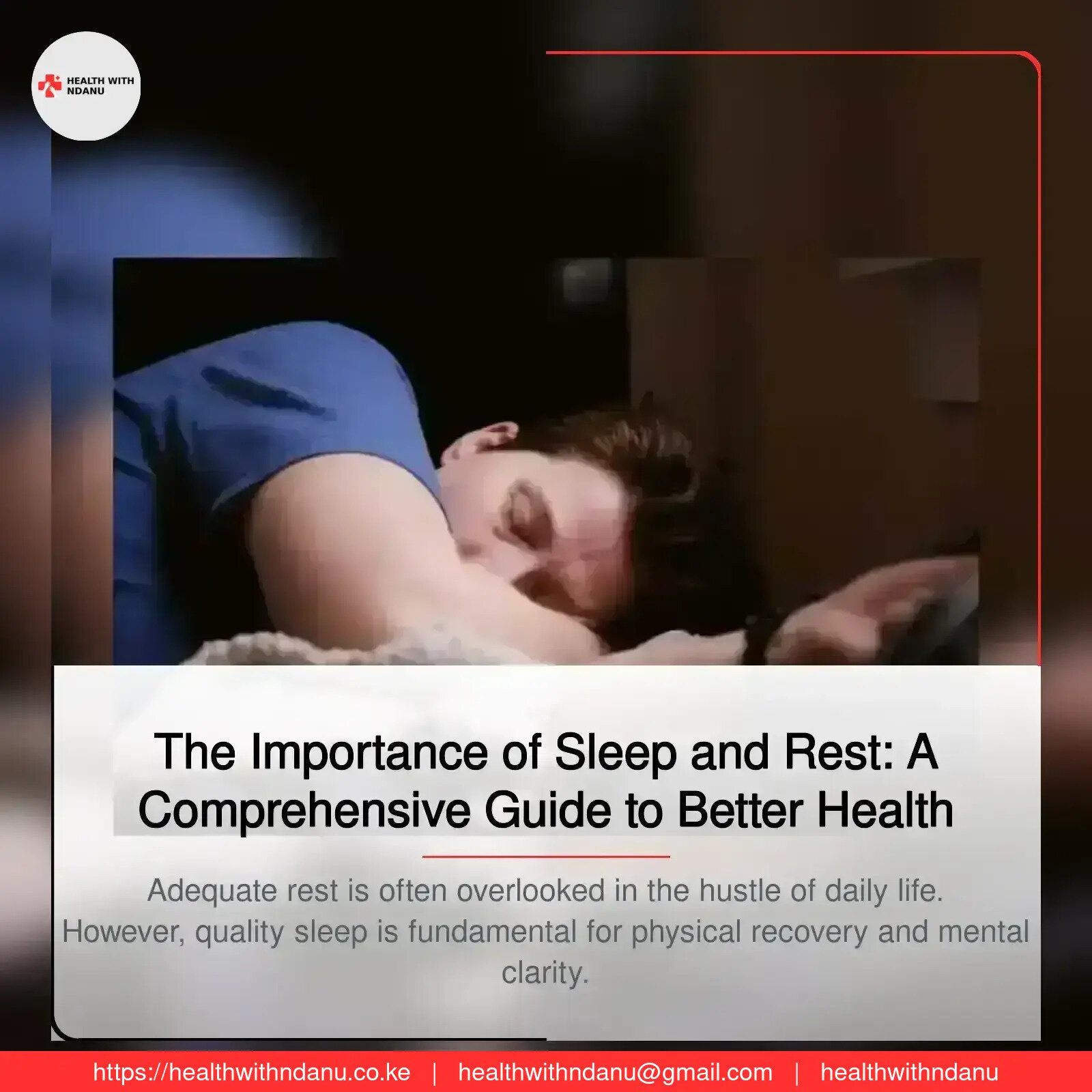The Importance of Sleep and Rest: A Comprehensive Guide to Better Health
- by Diana Ndanu
- 04 December, 2024
- 0 Comments
- 7 Mins



Introduction
Sleep and rest are fundamental aspects of human health, yet they are often overlooked in today’s fast-paced world. While most people focus on diet and exercise for wellness, neglecting sleep and rest can undermine overall well-being. These two components are essential for physical recovery, mental clarity, emotional balance, and optimal productivity. In this article, we’ll explore the science behind sleep, the benefits of adequate rest, tips for improving sleep quality, and the health risks of sleep deprivation.
Using evidence-based insights, this guide will emphasize the importance of prioritizing sleep hygiene, circadian rhythm alignment, and restful habits for a healthier lifestyle.
What is Sleep?
Sleep is a naturally recurring state of rest that allows the body and mind to recover and regenerate. It consists of several stages, each playing a vital role in maintaining health:
1. Non-REM (Rapid Eye Movement) Sleep: Divided into three stages (N1, N2, and N3), this phase is responsible for physical restoration and repair.
2. REM Sleep: This stage is associated with vivid dreaming and plays a key role in emotional regulation, memory consolidation, and cognitive function.
Adults generally require 7-9 hours of sleep per night, while children and teenagers need more to support growth and development.
Benefits of Sleep and Rest
1. Physical Health
Sleep supports various biological functions, including:
- Cellular Repair: During deep sleep, the body repairs damaged cells, tissues, and muscles, aiding recovery from injuries and illnesses.
- Immune System Support: Adequate sleep boosts immune function, helping the body fight infections and reducing the risk of chronic conditions.
- Heart Health: Proper sleep regulates blood pressure and reduces the risk of cardiovascular diseases.
- Hormonal Balance: Sleep influences hormone production, including those responsible for appetite control (leptin and ghrelin), stress (cortisol), and growth.
2. Mental and Emotional Health
Rest and sleep play critical roles in maintaining mental clarity and emotional balance:
- Cognitive Function: Sleep enhances memory, learning, problem-solving, and decision-making skills.
- Emotional Stability: Poor sleep is linked to increased irritability, mood swings, anxiety, and depression.
- Brain Detoxification: The brain clears out waste products during sleep, improving mental performance.
3. Energy and Productivity
A well-rested body and mind are more energetic and efficient. Sleep enhances:
- Physical Stamina: Athletes and active individuals benefit from improved endurance and recovery.
- Work Performance: Focus, creativity, and problem-solving abilities are heightened with adequate rest.
- Safety: Sleep reduces the risk of accidents caused by fatigue or poor judgment.
4. Weight Management
Sleep influences metabolism and hunger hormones, making it a critical factor in weight management:
- Reduced Cravings: Proper sleep lowers ghrelin (hunger hormone) and increases leptin (satiety hormone), curbing overeating.
- Better Energy Levels: With sufficient rest, individuals are more likely to stay active and maintain a healthy weight.
The Science of Circadian Rhythms
Circadian rhythms are 24-hour cycles that regulate the sleep-wake cycle. They are controlled by the suprachiasmatic nucleus (SCN) in the brain, which responds to light and darkness.
- Morning Light: Exposure to natural sunlight in the morning helps regulate circadian rhythms and promotes wakefulness.
- Melatonin Production: As darkness falls, the brain produces melatonin, a hormone that signals the body to prepare for sleep.
Disruptions to circadian rhythms, such as shift work, travel across time zones, or irregular sleep patterns, can lead to insomnia, fatigue, and health issues.
Health Risks of Sleep Deprivation
Chronic sleep deprivation can have serious consequences, including:
1. Cognitive Decline: Sleep loss impairs memory, concentration, and decision-making.
2. Weakened Immune System: Persistent lack of sleep increases susceptibility to illnesses.
3. Increased Risk of Chronic Diseases: Poor sleep is linked to diabetes, heart disease, obesity, and stroke.
4. Mental Health Disorders: Sleep deprivation exacerbates conditions like anxiety, depression, and bipolar disorder.
5. Premature Aging: Chronic sleep debt accelerates aging, causing wrinkles, dull skin, and reduced vitality.
How to Improve Sleep Quality
1. Adopt Healthy Sleep Hygiene
Maintain a Consistent Sleep Schedule: Go to bed and wake up at the same time daily, even on weekends.
- Create a Relaxing Bedtime Routine: Activities like reading, meditation, or warm baths signal the body to wind down.
- Optimize the Sleep Environment: Ensure your bedroom is dark, quiet, and cool, and invest in a comfortable mattress and pillows.
- Limit Screen Time: Blue light from screens inhibits melatonin production, so avoid devices at least 1-2 hours before bed.
2. Nutrition and Hydration
- Avoid Heavy Meals: Refrain from eating large meals or spicy foods close to bedtime.
- Limit Stimulants: Reduce caffeine and nicotine intake, especially in the afternoon and evening.
- Stay Hydrated: Drink enough water throughout the day, but limit fluids before bedtime to avoid waking up at night.
3. Incorporate Relaxation Techniques
- Deep Breathing: Slow, deep breaths calm the nervous system and prepare the body for rest.
- Progressive Muscle Relaxation: Tense and release muscles to reduce tension and promote relaxation.
- Mindfulness Meditation: Focused breathing and mindfulness practices improve sleep quality and reduce stress.
4. Exercise Regularly
Physical activity boosts sleep quality by reducing stress and improving overall health. However, avoid vigorous workouts close to bedtime, as they may interfere with sleep.
The Role of Rest in Health
While sleep is critical, rest also encompasses periods of relaxation and mental disengagement during waking hours.
- Active Rest: Includes light physical activities like walking, stretching, or yoga.
- Mental Rest: Involves breaks from work, social media, or screen time to recharge the brain.
- Social Rest: Spending time alone or with supportive friends and family helps rejuvenate emotional health.
Incorporating rest into daily routines can prevent burnout, improve focus, and enhance overall quality of life.
Common Sleep Disorders and Solutions
1. Insomnia
- Symptoms: Difficulty falling asleep, staying asleep, or waking up too early.
- Solutions: Cognitive Behavioral Therapy for Insomnia (CBT-I), sleep hygiene practices, and relaxation techniques.
2. Sleep Apnea
- Symptoms: Interrupted breathing during sleep, loud snoring, and excessive daytime sleepiness.
- Solutions: Lifestyle changes, CPAP therapy, or medical interventions.
3. Restless Legs Syndrome (RLS)
- Symptoms: Uncomfortable sensations in the legs, often relieved by movement.
- Solutions: Iron supplements, medications, and lifestyle adjustments.
Tips for Long-Term Sleep Success
1. Track Your Sleep: Use apps or wearables to monitor sleep patterns and identify areas for improvement.
2. Seek Professional Help: If sleep issues persist, consult a healthcare provider or sleep specialist.
3. Prioritize Stress Management: Chronic stress is a major disruptor of sleep, so incorporate stress-reducing activities into your routine.
4. Stay Committed: Building good sleep habits takes time and consistency but leads to lasting health benefits.
Conclusion
Sleep and rest are non-negotiable pillars of health, influencing everything from physical recovery to emotional stability. By prioritizing quality sleep and incorporating restful practices into your daily routine, you can enhance your well-being, productivity, and overall quality of life.
Remember, small changes in sleep habits can yield significant benefits over time. Whether it’s sticking to a regular bedtime, creating a calming night time ritual, or addressing sleep disorders, taking proactive steps toward better sleep is an investment in your future health.
By understanding the importance of sleep and rest, you empower yourself to live a healthier, more fulfilling life. Start today by making sleep a priority, and experience the transformative power of true rest.
Got Your Own Experience? Share with us
Popular Categories
Most Visited Blogs
Daily Newsletter
Get all the top stories from Blogs to keep track.



